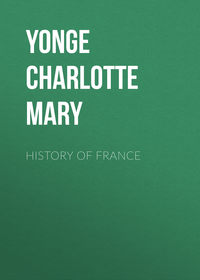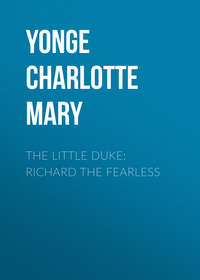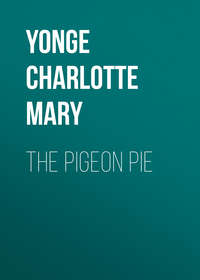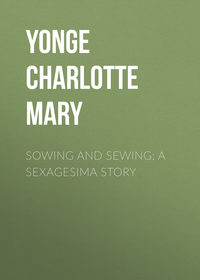
The Stokesley Secret
If any of the children thought it unjust that Susan’s lessons should be let off, they were wrong. Parents and teachers must have the power of doing such things without being judged. Sometimes they see that a child is really unable to learn, when the others perceive no difference; and it would be very harsh and cruel to oppress one who is out of order for fear little silly, idle, healthy things should think themselves hardly used.
At any rate, the lessons were capitally done; and when the children met again, they were all so much brighter and more hopeful, that they quite believed that their Mamma was going to get better very fast. Bessie especially was so resolved that thus it should be, that she shut herself into Miss Fosbrook’s room, and drew and painted with all her might, as if preparing for Mamma’s birthday made it certain that it would be kept.
The boys brought word that they would have a holiday the next day, as it was the Feast of St. Barnabas, and after morning service Mr. Carey was going to meet his brother and bring him home.
“I shall be all the more certain to get the sovereign, or two sovereigns,” said Henry to David, the only person whom he could find to listen to him, “if Sam is gone; and everyone will be caring about me.”
“And then you’ll give it to the pig,” said David.
“Oh yes, to be sure. You will grow into a pig yourself if you go on that way, David.”
However, David, partaking the family distrust of Hal’s birds-in-the-bush, and being started on the subject of the hoard, ran up to Sam, who was learning his lessons by way of something to do, and said, “If you go to London, Sam, may I have your sixpence on Monday for the pig?”
“I don’t know that I am going.”
“But if you do—or we sha’n’t get the pig.”
“I don’t care.”
“Don’t you care if we don’t get the pig?”
“No. Be off with you.”
David next betook himself to his eldest sister, who was trying to write to her father, and finding such a letter harder and sadder work than that to Ida Greville, though no one teased her about writing, blots, or spelling.
“If you go to London, Susie,” said he, in the very same words, “may I have your sixpence on Monday for the pig?”
“Oh, Davie, don’t be tiresome!”
David only said it over again in the same words, and put his hand down on her letter in his earnestness.
“Come away, Davie,” said Miss Fosbrook; “don’t tease your sister.”
“I want her to say I may have her sixpence on Monday for the pig.”
“No, you sha’n’t, then,” said Susan angrily; “you care for the nasty pig more than for poor Mamma or anyone else, and you sha’n’t have it.”
So seldom did Susan say anything cross, that everyone looked up surprised. Miss Fosbrook saw that it was sheer unhappiness that made her speak sharply, and would not take any notice, except by gently taking away the pertinacious David.
He was very much distressed at the refusal; and when Miss Fosbrook told him that his brother and sister could not think of such things when they were in such trouble, he only answered, “But Hannah Higgins won’t get her pig.”
Miss Fosbrook was vexed herself that her friend David should seem possessed with this single idea, as if it shut out all others from his mind. He was consoled fast enough; for Susan, with another great sob, threw down her pen, and coming up to stroke him down with her inky fingers, cried out, “O Davie, Davie, I didn’t mean it; I don’t know why I said it. You shall have my sixpence, or anything! But, oh dear, I wish the message was come, and we were going to dear Mamma, for I can’t write, and I don’t know what to do.”
Then she went back to her place, and tried to write, and sat with her head on her hand, and dawdled and cried and blotted till it grew so near post-time that at last Miss Fosbrook took the longest of her scrawls, and writing three lines at the bottom to say how it was with them all, directed it to Captain Merrifield, thinking that he would like it better than nothing from home, sent it off, and made Susan come out to refresh her hot eyes and burning head in the garden.
Sam presently came and walked on her other side, gravely and in silence, glad to be away from the chatter and disputes of the younger ones. That summons had made them both feel older, and less like children, than ever before; but they did not speak much, only, when they sat down on a garden bench, as Miss Fosbrook held Susan’s hand, she presently found some rough hard young fingers stealing into her own on the other side, and saw Sam’s eyes glistening with unshed tears. She stroked his hand, and they dropped fast: but he was ashamed to cry, and quickly dried them.
“I think,” she said, “that you will be a man, Sam; take care of Susan, and be a comfort to your father.”
“I hope I shall,” said Sam; “but I don’t know how.”
“Nobody can tell how beforehand,” she said. “Only watch to see what he may seem to want to have done for him. Sit quietly by, and don’t get in the way.”
“Were you ever so unhappy, Miss Fosbrook?” asked Susan.
“Yes, once I was, when my father was knocked down by an omnibus, and was very ill.”
“Tell us about it?” said Susan.
She did tell them of her week of sorrow and anxious care of the younger children, and the brightening ray of hope at last. It seemed to freshen both up, and give them hopes, for each drew a long sigh of relief; and then Sam said, “Papa wrote to Mr. Carey. She is to be prayed for in church to-morrow.”
“Oh,” said Susan, with a sound as of dismay, which made Christabel ask in wonder why she was sorry, when, from Susan’s half-uttered words, she found that the little girl fancied that a “happy issue out of all her afflictions” meant death.
“Oh no, my dear,” she said. “What it means is, that the afflictions may end happily in whatever way God may see to be best; it may be in getting well; it may be the other way: at any rate, it is asking that the distress may be over, not saying how.”
“Isn’t there some other prayer in the Prayer-book about it?” said Sam, looking straight before him.
“I will show you where to find it, in the Visitation of the Sick. I dare say it has often been read to her.”
The boy and girl came in with her, and brought their Prayer-books to her room, that she might mark them.
This had been a strange, long, sad day of waiting and watching for the telegram, and the children even fancied it might come in the middle of the night; but Miss Fosbrook thought this unlikely, and looked for the morrow’s post. There was no letter. It was very disappointing, but Miss Fosbrook thought it a good sign, since at least the danger could not be more pressing, and delay always left room for hope.
The children readily believed her; they were too young to go on dwelling long on what was not in sight; and even Susan was cheerful, and able to think about other things after her night’s rest, and the relief of not hearing a worse account.
The children might do as they pleased about going to church on saints’ days, and on this day all the three girls wished to go, as soon as it had been made clear that even if the message should come before the short service would be over, there would be ample time to reach the station before the next train. Miss Fosbrook was glad to prove this, for not only did she wish to have them in church, but she thought the weary watching for the telegram was the worst thing possible for Susan. Sam was also going to church, but Henry hung back, after accompanying them to the end of the kitchen-garden. “I wouldn’t go, Sam; just suppose if the message came without anyone at home, and you had to set out at once!”
“We couldn’t,” said Sam; “there’s no train.”
“Oh, but they always put on a special train whenever anyone is ill.”
“Then there would be plenty!”
“At least they did when Mr. Greville’s mother was ill, so they will now; and then you may ride upon the engine, for there won’t be any carriages, you know. I say, Sam, if you go to church, and the telegraph comes, I shall set off.”
“You’ll do no such thing,” said Sam. “You had much better come to church.”
“No, I sha’n’t. It is like a girl to go to church on a week-day.”
“It is much more like a girl to mind what a couple of asses, like the Grevilles, say,” returned Sam, taking up his cap and running after his sisters and their governess.
“It is quite right,” observed Henry to John and David, who alone remained to listen to him, “that one of us should stay in case the telegraph comes in, and there are any orders to give. I can catch the pony, you know, and ride off to Bonchamp, and if the special train is there, I shall get upon the engine.”
“But it is Sam and Susan who are going.”
“Oh, that’s only because Sam is eldest. I know Mamma would like to have me much better, because I don’t walk hard like Sam; and when I get there, she will be so much better already, and we shall be all right; and Admiral Penrose will be so delighted at my courage in riding on the engine and putting out the explosion, or something, that he will give me my appointment as naval cadet at once, and I shall have a dirk and a uniform, and a chest of my own, and be an officer, and get promoted for firing red-hot shot out of the batteries at Gibraltar.”
“Master Hal!” exclaimed Purday, “don’t throw them little apples about.”
“They are red-hot shot, Purday!”
“I’ll red-hot shot you if you break my cucumber frames, young gentleman! Come, get out with you.”
Probably anxiety made Purday cross as well as everyone else, or else he distrusted Henry’s discretion without Sam, for he hunted the little boys away wherever they went. Now they would break the cucumber frames; now they would meddle with the gooseberries, or trample on the beds; and at last he only relented so far as to let David stay with him on condition of being very good, and holding the little cabbages as he planted them out.
“Master Davie was a solemn one,” Purday said, and they were great friends; but Hal and Johnnie were fairly turned out, as their idle hands were continually finding fresh mischief to do in their sauntering desultory mood.
“I think,” said Hal, “since Purday is so savage, we’ll go and look out at the gate, and then we shall see if the telegraph comes.”
Johnnie had no clear idea what a telegraph was, and was curious to know how it would come, rather expecting it to be a man in a red coat on horseback, blowing a horn—a sight that certainly was not to be missed; so he willingly strolled down after Henry to the gate leading to the lane.
“I can’t see any way at all,” said Henry, looking out into the lane. “I shall get up, and so see over into the bend of the road;” and Hal mounted to the topmost bar of the gate, and sat astride there, John scrambling after him not quite so easily, his legs being less long, and his dress less convenient. Both knew that their Papa strongly objected to their climbing on this iron gate, the newest and handsomest thing about the place; but thought Hal, “Of course no one will care what I do when I am so anxious about poor Mamma!” and thought Johnnie, “What Hal does, of course I may do!”
So there the two young gentlemen sat perched, each with one leg on either side of the new iron gate. It was rather like sitting on the edge of a knife; and John could scarcely reach his toes down to rest them on the bar below, but he held on by the spikes, and it was so new and glorious a position, that it made up for a good deal to be five feet above the road; moreover, Hal said it was just like the mast-head of a man-of-war—at least, when the waves didn’t dash right overhead, like the picture of the Eddystone Lighthouse.
“Hollo! what, a couple of cherubs aloft!” cried a voice from the road; and looking round, Henry beheld the two Grevilles.
“Yes,” he answered; “it’s very jolly up here.”
“Eh! is it? Riding on a razor, to my mind. Come down, and have a lark,” said Osmond; while Martin, undoing the gate, proceeded to swing it backwards and forwards, to John’s extreme terror; but the more he clung to the spikes, and cried for mercy, the quicker Martin swung it, shouting with laughter at his fright. Henry meanwhile scrambled and tumbled to the ground, and caught the gate and held it fast, while he asked what his friends had been about. One held up a scarlet flask of powder, the other a bag of shot.
“You haven’t got a gun!”
“No, but we know where gardener keeps his; and the governor’s out for the day. Come along, Hal: you shall have your turn.”
“I don’t want to go far from home to-day.”
“Oh, stuff! What was it Mamma heard, Osmond? That your mother was ever so much better, wasn’t it?”
“I thought it was worse,” said Osmond.
“Well, never mind: your hanging about here won’t do her any good, I suppose.”
“No; but—”
“Oh, he’ll catch it from the governess!—I say, how many seams shall you have to sew to-day, Hal?”
“I don’t sew seams: I do as I please.”
“Ha! Is that them coming out of church!”
“Oh, it is! it is!” cried John from his elevation. “Oh, help me down, Hal!”
But Henry did not want Miss Fosbrook to find him partaking in gate-climbing; and either that desire, or the general terror a bad conscience, made him and the Grevilles run helter-skelter the opposite way, leaving poor little John stuck on the top of the gate, quite giddy at the thought of coming down alone, and almost as much afraid of being there caught by Miss Fosbrook coming home from church.
It was a false alarm after all, that the congregation were coming out. John would have been glad if they had; for nothing could be more miserable than sitting up there, his fingers tired of clutching the spikes, his feet strained with reaching down to the bar, his legs chilled with the wind, his head almost giddy when he thought of climbing down. He would have cried, could he have spared a hand to rub his eyes with; he had a great mind to have roared for help, especially when he heard feet upon the road; but these turned out to belong to five little village boys, still smaller than himself, who, when they saw the young gentleman on his perch, all stood still in a row, with their mouths wide open, staring at him. Johnnie scorned to let them think he was not riding there for his own pleasure; so he tried to put a bold face of the matter, and look as much at ease and indifferent as he could, under great bodily fear and discomfort, the injury of his brother’s desertion, the expectation of disgrace, and the reflection that he was being disobedient to his parents in the height of their trouble!
There is nothing in grief that of necessity makes children or grown people good. Sometimes, especially when there is suspense, it fills them with excitement, as well as putting them out of their usual habits; and thus it often happens that there are tremendous explosions of naughtiness just when some one is ill in a house, and the children ought to be most good. But it is certain that unless trouble be taken in the right way, it makes people worse instead of better.
CHAPTER XI
Hal had got into a mood in which he was tired of fears and of waiting for tidings, and was glad to shake off the thought, and be carried along to something new, he and the Grevilles were rather fond of one another’s company, in an idle sort of way. They “put him up to things,” as he said; they made a variety; and he was always glad of listeners to his wonderful stories, which rather diverted the other boys, who, though they sometimes made game of them, were much less apt to pick them to pieces than was Sam.
Poor Captain Merrifield! what had not befallen him, according to his son? He had been stuck on to a rock of loadstone; he had been bitten by mosquitos as big as jackdaws—at least as jack-snipes; he had sat down to rest on the trunk of a fallen tree, and it whisked him over on his face, and turned out to be a rattle-snake—at least, a boa-constrictor! Nay, Henry discoursed on the ponies he had himself tamed, the rabbits he had shot, the trees he had climbed, the nests he had found, the rats he had killed, in terms he durst not use when his brother was by; or if he did, and Sam brought him to book, he always said “it was all fun.” It often seemed as if he did not himself know whether he meant to be believed or otherwise; and as to his intentions for his sailor life, they were, as has been already seen, of the most splendid character! Sometimes he shot the French admiral dead from the mast-head; sometimes he sailed into Plymouth with the whole enemy’s fleet behind him; sometimes he, the youngest midshipman, rescued the whole crew in a wreck where all the other officers were drowned; sometimes he shot a shark through the head, just as it was about to make a meal of Prince Alfred!
He certainly was thus an entertaining companion to those who did not pay heed to truth, and liked to hear or laugh at great swelling words; and the Grevilles, on their idle day, were glad to have him with them, and were rather curious to prove how much fact there was in his boast of being a most admirable shot.
Meddling with guns was absolutely forbidden to all the three, except by special permission and with an elder looking on; but the Grevilles were not in the habit of obeying, except when they were forced to do so; and Henry, having once begun to think no one would heed his present doings, was ready to go on rather than be accused of minding his governess.
So the gardener’s gun was taken from the hiding-place, whither it had been conveyed from the tool-house; and the three boys ran off together, their first object being to get out of the Greville grounds, where they could be met by any of the men. They got quite out into the fields, before they ventured to stop that Osmond might load the gun. Each was to take a shot in turn; Osmond tried first, at a poor innocent young thrush, newly come out for his earliest flight. Happily he missed it; Martin claimed the next, and for want of anything better to shoot, took aim at the scare-crow in the middle of Farmer Grice’s beans. He was sure that he had hit it, and showed triumphantly the great holes in its hat; but the other boys were strongly persuaded that they had been there before.
“Well, come away,” said Osmond; “this is a great deal too near old Grice’s farm-yard. If we go popping about here, we shall have him out upon us, for an old tiger as he is!”
“Come along, then,” said Martin.
But Hal had just got the gun, and saw something so black and shiny through the hedge, that he was persuaded that a flock of rooks were feeding in the next field, and he fired!
Such a cackling and screeching as arose! and with it one dying gobble, and a very loud “Hollo! you rascal!”
“My eyes! you’ve been and gone and done it!” cried Osmond.
“Cut! cut!” screamed Martin; and Hal, not exactly knowing what he had done, but sure that it was something dreadful, and hearing voices in pursuit, threw down the gun, and took to his heels; but the others had the start of him, and were over the gap long before he could get to it. And even as he did reach it, a hand was on his throat, almost choking him, and a tremendous voice cried, “You young poacher, you sha’n’t get off that way! I’ll have you up to the Bench, that I will, for shooting the poor old turkey-cock before my very eyes.”
“Oh! don’t, don’t! I didn’t mean it,” cried Hal, turning in the terrible grip; “I thought it was only a rook!”
“A rook, I dare say! And what business had you to think, coming trespassing here on my ground, and breaking the hedges! I’d have you up for that, if for nothing else, you young vagabond!”
“Oh, don’t, don’t! I’m Henry Merrifield!”
“I don’t care if you’re Henry Merry Andrew!” said Farmer Grice, who was a surly man, and had a grudge of long standing against the Captain, for withstanding him at the Board of Guardians. “I’ll have the law out of you, whoever you are.”
“But—but—Mamma is so very ill!” cried Hal, bursting into tears.
“The more shame for you to be rampaging about the country this fashion,” said the farmer, giving him a shake that seemed to make all his bones rattle in his skin. “Serve you right if I flogged you within an inch of your life.”
“Oh, please don’t—I mean please do—anything but have me up to the magistrates! I’ll never do it again, never!” sobbed Henry in his terror.
Mr. Grice had some pity, and also knew that his wife and all the neighbours would be shocked at his prosecuting so young a boy, whose parents were in such distress. So he said, “There, then, I’ll overlook it this time, sir, so as I have the value of the bird.”
“And what is the value—” asked Henry, trembling.
“Value! Why, the breed came from Norfolk; he was three years old; and my missus set great store on him, he was as good as a house-dog, to keep idle children out of the yard; and it was quite a picture to see him posturing about, and setting up his tail! Value! not less than five-and-twenty shillings, sir.”
“But I have not five-and-twenty shillings. I can’t get them,” said Hal, falling back into misery.
“You should have thought of that before you shot poor old Tom Turkey!” quoth Farmer Grice.
“But what in the world shall I ever do?” said Henry.
“That’s for you to settle, sir,” said the farmer, taking up the unlucky gun. “I shall take this, and keep it out of further harm.”
“Oh pray, pray!” cried Henry. “It is not my gun; it is Mr. Greville’s; please let me have it!”
“What! was it those young dogs, the Master Grevilles, that were with you!” growled Mr. Grice. “If I’d known that, I’d not have let you off so easy. Those boys are the plague of the place; I wish it had been one of them as I’d caught, I’d have had some satisfaction out of them!”
Henry entreated again for the gun, explaining that they had not leave to take it; but the farmer was unrelenting. He might go to them, he said, to make up the price of the poor turkey-cock; how they could have got the gun was no affair of his; have it they should not, till the money was brought to him; and if it did not come before night, he should carry the gun up to the Park, and complain to Mr. Greville.
With this answer the unhappy Hal was released, and ran after his friends to tell them of the terms. He found them sitting on a low wall, just within their own grounds, waiting to hear what had become of him. When he had told his story, they both set upon him for betraying them, and declared that they should send him to Coventry ever after, and never do anything with him again; but as it was plain that the gun must be redeemed, if they wished to avoid severe punishment, there was a consultation. Nobody had much money; but Osmond consolingly suspected that the farmer would take less; five-and-twenty shillings was an exorbitant price to set on a turkey-cock’s head, and perhaps half would content him.
The half, however, seemed as impossible as the whole. Osmond had three shillings, Martin two, Hal fourpence! What was to be done? And the boys declared that if it should come to their father’s knowledge, Hal, who had given up their names, should certainly not be shielded by them. In fact, he, who had done the deed, was the only one who ought to pay.
The sound of the servants’ dinner-bell at the Park broke up the consultation; the boys must not be missed at luncheon; and they therefore separated, agreeing to meet at that same place at four o’clock, to hear the result of Hal’s negotiation with the farmer; for neither of the Grevilles would hear of helping him to face the enemy.
Poor Hal plodded home disconsolately. Once he thought of telling Sam, and asking his help; but Sam would be so much shocked at such a scrape at such a time, as possibly to lick him for it before helping him. Indeed Hal did not see much chance of Sam being able to do anything for them; and he had too often boasted over his elder brother to like to abase himself by such a confession—when, too, it would almost be owning how much better it would have been to have followed Sam’s advice and have gone safely to church.
Could he borrow of any one? Had he nothing of his own to sell or exchange? Ah! if it had not been for that stupid hoard of little David’s, he might have had even so much! By-the-bye, some of that collection was his own. He might quite lawfully take that back again. How much could it be? How much did he put in last week? the week before? Oh, never mind; some of it was his at all events; there was no harm in taking that. Most likely he should be able to restore it four-fold when Colonel Carey made his present; or, if not, nobody knew exactly what was in Toby Fillpot; and after all very likely they would forget all about it; people could not think about pigs when Mamma was ill; or, maybe, he should go to join his ship, and hear no more of it. So he came home, and crossed the paddock just as the dinner-bell was ringing, opening the hall-door as the children were running across it to the dining-room.









